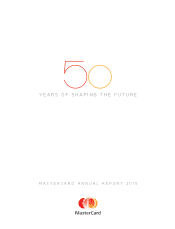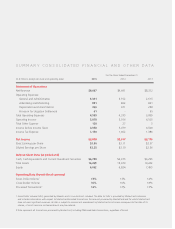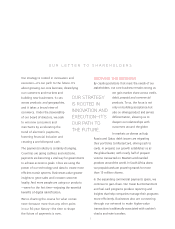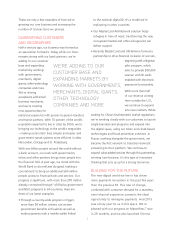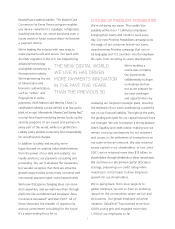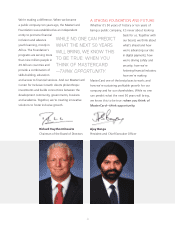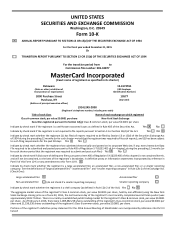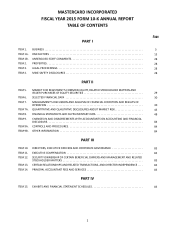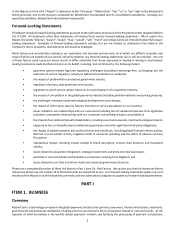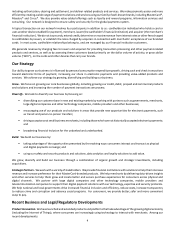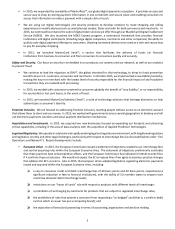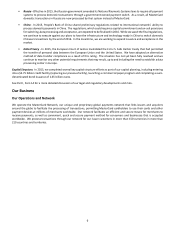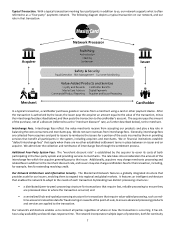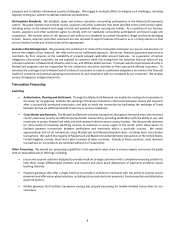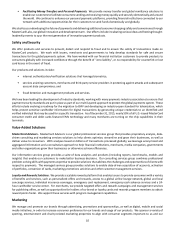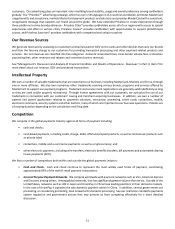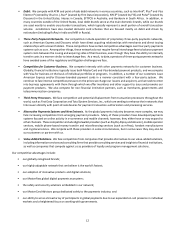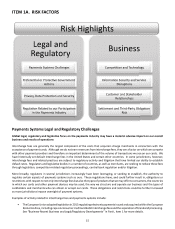MasterCard 2015 Annual Report Download - page 11
Download and view the complete annual report
Please find page 11 of the 2015 MasterCard annual report below. You can navigate through the pages in the report by either clicking on the pages listed below, or by using the keyword search tool below to find specific information within the annual report.
5
• In 2015, we expanded the availability of MasterPass™, our global digital payments ecosystem. It provides an easy and
secure way to shop by storing payment information in one convenient and secure place and enabling consumers to
access that information to make a payment with a simple click or touch.
• We are using our digital technologies and security protocols to develop solutions to make shopping and selling
experiences on mobile devices (such as smartphones) simpler, faster and safer for both consumers and merchants. In
2015, we continued to enhance the suite of digital token services we offer through our MasterCard Digital Enablement
Service (MDES). We also launched the MDES Express program, a commercial framework that provides financial
institutions and digital participants (including large digital companies, merchants and other companies) the ability to
quickly scale digital payment offerings to consumers, allowing connected devices to be used as a safe and secure way
to pay for everyday shopping.
• In 2015, we launched MasterCard Send™, a service that facilitates the delivery of funds via financial
institutions from business to consumer and from consumers to consumers quickly and securely.
Safety and Security. Our focus on security is embedded in our products, our systems and our network, as well as our analytics
to prevent fraud:
• We continue to lead the migration to EMV®, the global standard for chip technology, to bring its fraud prevention
benefits to our U.S. customers, consumers and merchants. In October 2015, we implemented a new liability hierarchy,
making the issuer or merchant with the lowest level of security responsible for the financial impact of any fraudulent
transactions they are involved with processing.
• In 2015, we worked with customers to extend to consumers globally the benefit of “zero liability”, or no responsibility
for counterfeit or lost card losses, in the event of fraud.
• In 2015, we launched MasterCard Identity Check™, a suite of technology solutions that leverage biometrics to help
authenticate a consumer’s identity.
Financial Inclusion. We are focused on addressing financial inclusion, reaching people without access to an electronic account
that allows them to store and use money. In 2015, we worked with governments across several geographies to develop and roll
out electronic payments solutions and social payment distribution mechanisms.
Acquisitions and Investments. In 2015, we acquired two new businesses focused on expanding our footprint and enhancing
critical capabilities, including in the area of data analytics with the acquisition of Applied Predictive Technologies.
Legal and Regulatory. We operate in a dynamic and rapidly evolving legal and regulatory environment, with heightened regulatory
and legislative scrutiny and other legal challenges, particularly with respect to interchange fees (as discussed below under “Our
Operations and Network”). Recent developments include:
• European Union - In 2015, the European Commission issued a statement of objections related to our interchange fees
and central acquiring rules within the European Economic Area. The statement of objections preliminarily concludes
that these practices have anticompetitive effects, and the European Commission has indicated it intends to seek fines
if it confirms these conclusions. We would not expect the EC to impose fines if we agree to business practice changes
that address the EC’s concerns. Also in 2015, the European Union adopted legislation regulating electronic payments
issued and acquired within the European Economic Area, including:
a cap on consumer credit and debit interchange fees of 30 basis points and 20 basis points, respectively (a
significant reduction in fees to financial institutions), with the ability of EU member states to impose more
restrictive domestic debit interchange levels;
restrictions on our “honor all cards” rule with respect to products with different levels of interchange;
a prohibition of surcharging by merchants for products that are subject to regulated interchange rates;
the prohibition of rules that prevent a consumer from requesting a “co-badged” card (that is, a credit or debit
card on which an issuer has put a competing brand); and
the separation of brand and processing in terms of accounting, organization and decision making.

